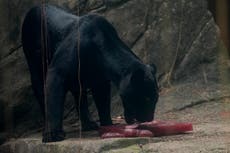Roads, pet dogs and power lines pose hidden threat to Africa’s tiny primates
South Africa is home to more than 675,000 miles (1,090,000 kilometres) of roads and power lines
Roads, power lines, and pet dogs are taking a much bigger toll on primates in South Africa, according to a pair of forensic studies.
The country is home to five species of primates, including greater and southern lesser bushbabies. These primates spend most of their lives in trees, and some are so small they can fit in the palm of your hand.
Scientists at the South African Lajuma Research Centre analysed hundreds of cases in which primates had been killed on roads or around power lines across the country. In a companion paper, the researchers explored the growing risk pet dogs pose to the animals.
“Bushbabies, especially, are an example of species that may be having problems, but we don’t know what they are until we go looking,” said Michelle Sauther, co-author of the two studies and professor of anthropology at CU Boulder.
For her, the results border on personal. In the process of studying bushbabies in South Africa for more than a decade, Sauther and her colleagues got to know one male —a greater bushbaby with one eye who the team nicknamed Bruiser because he reminded them of an old prize fighter.
Then in 2019, Bruiser, who had bad and missing teeth, tried to move on the ground to reach a fig tree with easy-to-grab fruit. A pet dog found and killed him.
“These are small stories,” Sauther said. “They're not the big stories of conservation, but they really do matter, especially as we have no good data on bushbaby mortality and thus cannot easily judge their conservation status.”
“We found that all South African non-human primates are in one way or the other impacted by human linear infrastructure, such as power lines or roads,” said Birte Linden, a primatologist from South Africa.
She first became interested in the hidden dangers facing primates on her almost daily drives to the University of Venda in South Africa’s Soutpansberg Mountains.
She kept seeing samango monkeys run over on the side of the road. These monkeys are listed in the “Red List of Mammals of South Africa, Swaziland and Lesotho” as “vulnerable,” one step up from “endangered.”
“It's one stretch where the road is quite close to indigenous forest, which is where samango monkeys typically live,” Linden said.
She wondered if a lot more non-human primates could be dying as roadkill than researchers suspected. South Africa is home to more than 675,000 miles (1,090,000 kilometres) of roads and power lines — and the number keeps climbing.
Researchers tracked down 13 reports of greater bushbabies like Bruiser killed by dogs in South Africa since 2014. In one case, humans intentionally released dogs to hunt down a bushbaby that had gotten too close to town.
“These reports are clearly a sliver of what’s actually happening,” said Frank Cuozzo of the Lajuma Research Centre.
“It’s happening in the towns and suburban areas, in the rural areas, the reserve areas, and it’s happening far more than anyone would think.”
Join our commenting forum
Join thought-provoking conversations, follow other Independent readers and see their replies
Comments



Bookmark popover
Removed from bookmarks